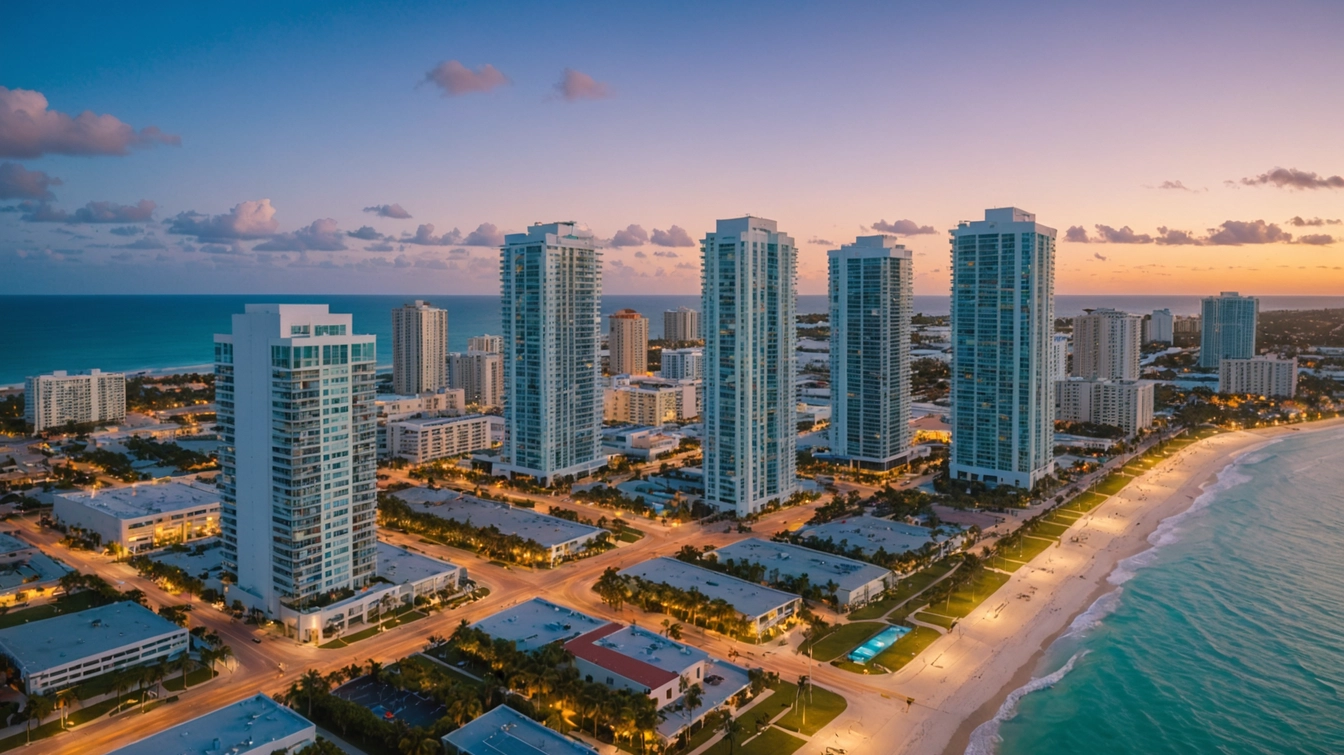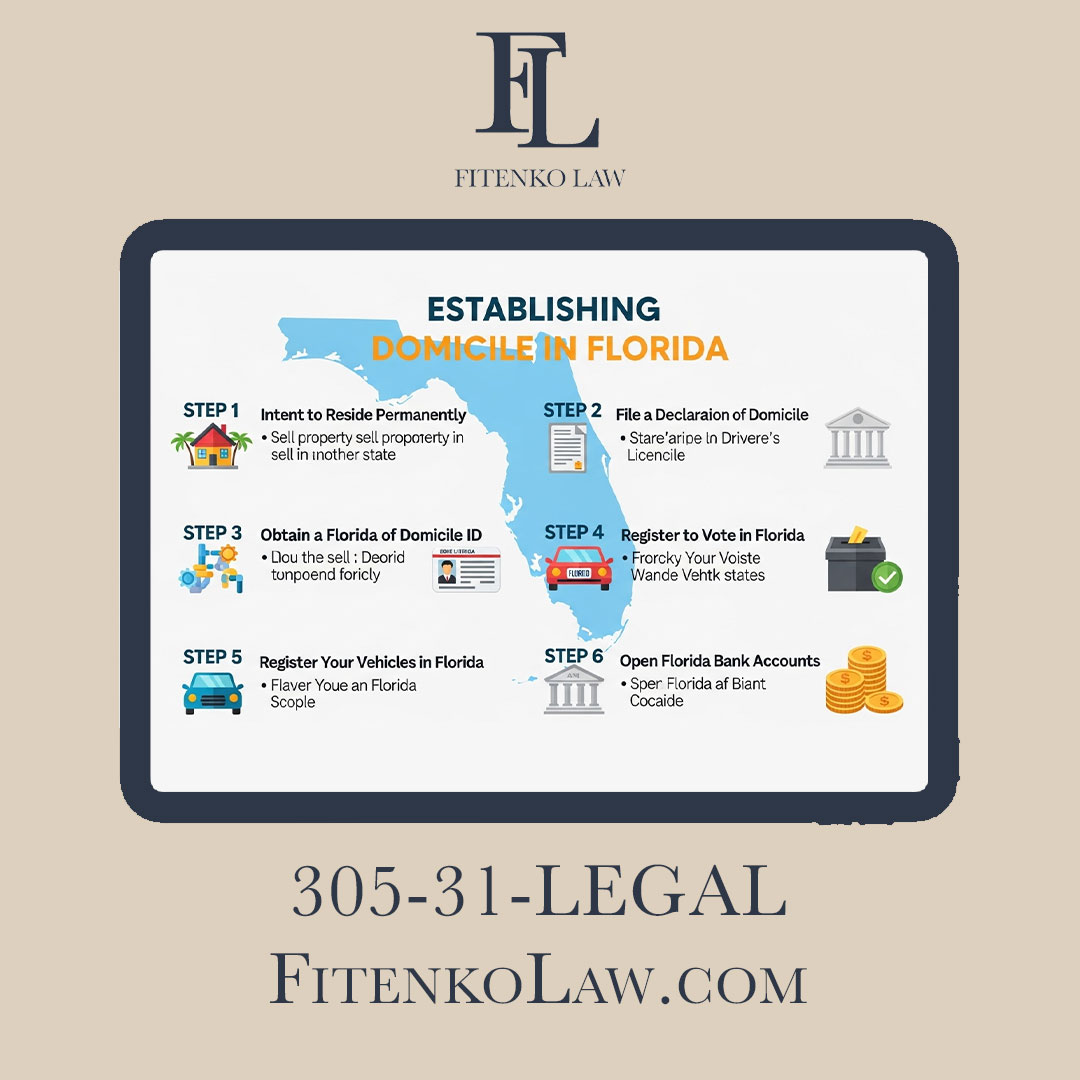Your Guide to E-2 & EB-5 Visas in South Florida
South Florida has long established itself as a global hub for business, commerce, and a luxurious lifestyle. For international investors and entrepreneurs, cities like Hallandale Beach, Sunny Isles, and Aventura represent not just a vacation destination, but fertile ground for capital growth and ambitious projects. The path to conducting business and residing in the United States lies through its complex immigration system, specifically via investor visas. Two of the most powerful tools in a foreign investor’s arsenal are the E-2 Treaty Investor Visa and the EB-5 Immigrant Investor Program.
At Fitenko Law, we specialize in providing strategic legal counsel to high-net-worth clients seeking these prestigious visas. Our office in Hallandale Beach serves as a nexus for investors from around the globe. We understand that your goal is not simply to obtain a visa, but to build a successful future in the U.S. Therefore, our approach integrates deep knowledge of immigration law with expertise in real estate and estate planning to ensure comprehensive protection of your interests. This guide will provide you with an exhaustive overview of the E-2 and EB-5 visas, clarifying complex requirements and illuminating the path to success.
Why Do Investors Choose South Florida?
The appeal of South Florida for international investors is undeniable. First, the state offers an exceptionally favorable tax climate with no state income tax, estate tax, or inheritance tax. This allows you to preserve a significantly larger portion of your capital. Second, the region is a dynamic economic center with direct access to Latin American and European markets. Finally, the high quality of life, beautiful weather, and sophisticated infrastructure in communities like Sunny Isles make it an ideal place to live and raise a family.
It is in this context that investor visas become the key to unlocking the American dream. They not only provide the legal right to live and work in the U.S. but also serve as a foundation for long-term financial stability and growth. However, each visa program has its unique nuances and requirements. The choice between the E-2 and EB-5 depends on your citizenship, financial capacity, business objectives, and long-term immigration goals. At Fitenko Law, we begin with a detailed analysis of your situation to develop the most effective strategy. Contact us for a personalized consultation.
The E-2 Visa: Actively Managing Your U.S. Business
The E-2 Treaty Investor visa is one of the most popular and flexible pathways for foreign entrepreneurs. It allows citizens of qualifying treaty countries to live and work in America based on a substantial investment in a U.S. business. Unlike the EB-5 visa, the E-2 is a non-immigrant visa. However, with proper business management, it can be renewed almost indefinitely, making it a de facto long-term solution for many.
This visa is ideal for those who want to be actively involved in the management of their enterprise. Whether you’re opening a new restaurant in Aventura, purchasing an existing consulting firm in North Miami, or launching a tech startup, the E-2 visa provides the necessary platform. The success of a petition hinges on meticulous preparation and demonstrating that your business is a real, operating enterprise capable of benefiting the U.S. economy.
Key Requirements for the E-2 Visa
To qualify for an E-2 visa, an applicant must meet several strict criteria. Failure to satisfy any one of them will result in a denial. Our job at Fitenko Law is to ensure that every aspect of your petition is flawless.
- Treaty Country Citizenship: You must be a citizen of a country that maintains a current treaty of commerce and navigation with the United States. The list of these countries is available on the U.S. Department of State website.
- Substantial Investment: You must have invested, or be in the active process of investing, a “substantial” amount of capital. The law does not define a precise figure, but it must be sufficient to establish and operate the business successfully.
- Real and Operating Business: The investment must be in a bona fide, for-profit commercial enterprise. Passive investments, such as holding stock or undeveloped land, do not qualify.
- Non-Marginal Enterprise: The business cannot be “marginal,” meaning it must have the present or future capacity to generate significantly more income than just enough to provide a minimal living for the investor and their family.
- Investor’s Role: You must be coming to the U.S. to “develop and direct” the enterprise. This is typically proven by showing at least 50% ownership or by possessing operational control through a managerial position.
Each of these requirements demands thorough documentation, from the business plan to the source of funds evidence. We help our clients assemble a compelling package that leaves no room for doubt.
What Qualifies as a “Substantial” Investment?
The concept of “substantiality” is flexible and evaluated using a “proportionality test.” The lower the total cost of the business, the higher the percentage of your investment must be. For example, for a $100,000 business, an investment of $90,000 would likely be considered substantial. For a $1 million business, a $600,000 investment could also qualify. In practice, while there is no official minimum, petitions with investments below $100,000 face closer scrutiny.
Crucially, the funds must be “irrevocably committed.” This means the capital must be at risk of loss. Simply holding money in a bank account is not enough. The funds must be spent on business expenses such as office rent, equipment purchases, marketing, or initial inventory. The use of an escrow account that releases the funds upon visa approval is a common and acceptable strategy.
Proving the Business is Not Marginal
To prove your business is not marginal, you must demonstrate its economic impact. The best way to do this is by showing that the business will create jobs for U.S. workers. Although there is no strict requirement for the number of jobs created, a detailed five-year business plan with hiring forecasts is a critical element of the petition.
For example, if you are opening a café in Hollywood, Florida, your business plan should include a staffing chart with positions (baristas, chefs, managers), their salaries, and a hiring timeline. This convincingly demonstrates to the consular officer that your enterprise will make a positive contribution to the local economy, rather than merely serving to support your own lifestyle. For more information and insights, please visit our law blog.
The EB-5 Visa: A Direct Path to a Green Card Through Investment
The EB-5 Immigrant Investor Program is one of the most direct paths to obtaining a U.S. permanent resident card (green card) for an investor, their spouse, and their unmarried children under 21. Unlike the E-2, the EB-5 is an immigrant program, designed from the outset to grant permanent resident status. However, it requires a significantly larger capital outlay and has more stringent and complex requirements.
The EB-5 program was created by Congress to stimulate the U.S. economy through foreign capital injection and job creation for U.S. workers. Successfully navigating the EB-5 program leads first to a two-year conditional green card, and then, upon fulfillment of all conditions, to a permanent green card. This path requires careful planning, comprehensive due diligence, and patience. The team at Fitenko Law has the experience to guide investors through every stage of this intricate process.
EB-5 Investment and Job Creation Requirements
The EB-5 program has two primary investment tiers, which depend on the project’s location:
- $1,050,000 — The standard minimum investment amount.
- $800,000 — The reduced amount for investments in projects located in a “Targeted Employment Area” (TEA). A TEA is defined as a rural area or an area with high unemployment (at least 150% of the national average).
The vast majority of investors choose projects in TEAs to take advantage of the lower investment threshold. In addition to the capital investment, the key requirement is the creation of at least 10 full-time jobs for qualifying U.S. workers. These jobs must be created within the two-year period of the investor’s conditional residency. The method of counting these jobs depends on the type of investment.
Two Investment Paths: Direct Investment vs. Regional Centers
EB-5 investors can choose one of two paths:
- Direct Investment: The investor creates their own new commercial enterprise or invests in an existing business. In this case, the investor must prove that their enterprise directly created 10 jobs (W-2 employees). This path requires active involvement in managing the business.
- Regional Center Investment: This is the most popular option. Regional Centers are entities authorized by U.S. Citizenship and Immigration Services (USCIS) to manage EB-5 investment projects. By investing through a Regional Center, the investor can count not only direct jobs but also indirect and induced jobs calculated using economic models. This significantly simplifies meeting the job creation requirement. Additionally, the investor’s role can be more passive (e.g., as a limited partner).
Choosing between a direct investment and a Regional Center is a critical decision. We help our clients conduct comprehensive due diligence on both Regional Centers and specific projects to minimize risk. Official information about the program can be found on the USCIS website.
The Critical Importance of a Lawful Source of Funds
One of the most complex and labor-intensive aspects of an EB-5 petition is the requirement to provide exhaustive evidence that the investment capital was obtained through lawful means. The investor must trace the funds from their original source to the moment they are invested in the EB-5 project. This is known as the “source of funds” report.
Acceptable sources of funds include, but are not limited to:
- Salary and bonus income
- Income from your own business
- Sale of real estate or other assets
- Inheritance
- Gifts from family members (in which case, the donor’s lawful source of funds must also be proven)
- Loans (under certain conditions)
Our immigration attorneys work closely with clients and their financial advisors to gather the necessary documentation, such as tax returns, bank statements, sale agreements, and other financial records, to create an irrefutable source of funds report that will satisfy the strict requirements of USCIS.
Integrating Your Investor Visa with Real Estate and Estate Planning
Obtaining an investor visa is not the final goal; it is the beginning of a new chapter of your life in the United States. For many of our clients, this chapter includes purchasing residential or commercial property and the need to protect their assets in a new jurisdiction. At Fitenko Law, we understand this interconnection and offer a comprehensive approach that extends beyond immigration law. Our goal is to ensure your complete legal and financial security.
Purchasing Real Estate as Part of Your Investment Strategy
Purchasing property in Florida is a logical step for a new investor. Whether it’s a family home in Aventura or an office space for your new E-2 business, it is crucial to structure the transaction correctly. Our team of real estate lawyers accompanies clients at all stages:
- Conducting legal due diligence on the property.
- Structuring ownership (e.g., through an LLC or trust) to optimize taxes and protect assets.
- Reviewing and drafting purchase and sale agreements.
- Assisting with the closing, including handling issues related to FIRPTA (the Foreign Investment in Real Property Tax Act).
We ensure that your real estate investments not only match your lifestyle but also harmonize with your overall financial and immigration structure.
Estate Planning: Asset Protection for International Investors
Upon moving to the U.S., you become subject to American inheritance and tax laws. Florida’s laws can differ dramatically from those of your home country. Without proper planning, your assets could be subject to high U.S. estate taxes, and the process of transferring them to your heirs could become complicated and costly. This is especially true for non-U.S. citizens.
Our experts in estate planning develop customized strategies to protect your wealth. We use tools such as:
- Wills: To dispose of your Florida property according to your wishes.
- Revocable and Irrevocable Trusts: To protect assets from creditors, minimize taxes, and avoid the lengthy probate process.
- Qualified Domestic Trusts (QDOTs): A special tool for married couples where one spouse is not a U.S. citizen, allowing for the deferral of estate taxes.
- Powers of Attorney: To manage your financial and medical affairs in the event of incapacitation.
Proactive estate planning is an integral part of responsible asset management in a new country. We will help you create a robust plan that secures your family’s future.
Why Choose Fitenko Law for Your Investor Visa Case?
The choice of an immigration attorney is a decisive factor that can determine the success or failure of your petition. The process for obtaining E-2 and EB-5 visas is extraordinarily complex, requiring meticulous attention to detail and a deep understanding not only of the law but also of USCIS policy. At Fitenko Law, we offer a unique combination of experience, a personalized approach, and comprehensive services, making us the ideal partner for ambitious investors in South Florida.
We are not a large, impersonal firm. We are a boutique practice, which allows us to give each client the personal attention they deserve. We understand that what’s at stake is not just an investment, but your future and your family’s future. Our team works closely with you every step of the way, from initial strategy development to celebrating your visa approval. We pride ourselves on our transparency, accessibility, and commitment to excellence.
Our integrated approach is our key advantage. You will not need to find separate lawyers for immigration, real estate, and estate planning matters. We provide all these services under one roof, ensuring the coherence and efficiency of your overall strategy. We are your one-stop legal counsel for all matters related to moving to and settling in the United States.
If you are ready to take the next step toward realizing your investment and immigration goals in the United States, we invite you to contact Fitenko Law. Schedule a confidential consultation to discuss your situation with an experienced investor visa attorney in Hallandale Beach. Let us help you build your successful future in Florida.






